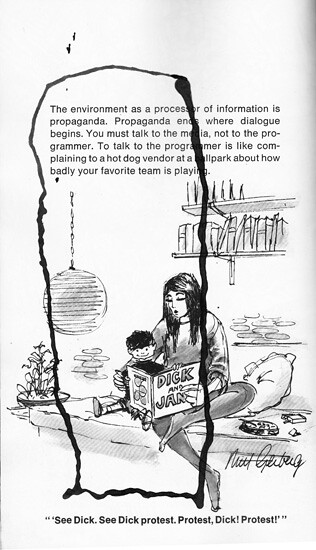Despite ideological differences, the various factions that make up the political right in America—from the grassroots to the astroturfed to the corporate—have found common ground after Obama’s 2008 victory.1 This ground is the past: an arid patch of mythological land that has become home to a growing organizing effort driven by anti-tax sentiments, elements of nationalism, and a vicious streak against a laundry list of undesirables.2 This movement only knows one way forward: back.
Consider the recent time warp at the National Portrait Gallery in Washington, DC. David Wojnarowicz’s video Fire in My Belly (1986–87) was removed from an exhibition mounted there by the Smithsonian (the gallery’s parent institution) after complaints were lodged by the Catholic League and Republican Congressman Eric Cantor that the work was “anti-religious” and therefore a form of hate speech.3 The video itself shows no semblance of a critique of religion. In fact, the work uses Christian iconography as it was historically intended, as the lingua franca of suffering and redemption in dark times, like the medievalism of the early age of the AIDS crisis. But Cantor and the Catholic League did not see this, if they saw the work at all. What they did see was an opportunity to reignite the culture wars of the late 1980s—in which Wojnarowicz was also a target—by attacking gay visibility and acceptance in order to wage a proxy battle against the repeal of the military ban on serving openly in the military and the increasing pressure to legalize gay marriages in all fifty states.4


Are the eighties not bygone enough? One of the consequences of the Republican takeover of Congress after the 2010 midterm elections has been that Texas libertarian congressman Ron Paul now chairs the subcommittee on domestic monetary policy in the House of Representatives. And Paul recently reiterated that he wants the US to go back to the gold standard, essentially pinning the value of the dollar to the fixed weight of gold.5 This was the US monetary policy up to 1930s, when there was a near universal belief that gold was the only value paper money represented. A nation’s economy based on the gold standard is essentially beholden to miners for their money supply. FDR took the US off the gold standard in 1933.
Are the thirties still too modern? One can revel in the musty pageantry of the Tea Party protests that continue to fly the freak flag across the country. Standing for Taxed Enough Already, the Tea Party self-consciously echoes the rhetoric and sometimes the dress of early Americans resisting taxes imposed on the colonies by King George III.6 The Boston Tea Party, in which colonialists dumped a shipment of tea imported from England into the Boston harbor in 1773, has since become a beacon for the idea that taxation without representation is tyranny.7 For the Tea Party of 2009, this idea has become a call to arms, gathering libertarians, Ayn Randers, evangelicals, Christian nationals, militiamen, strict Constitutionalists, 9/11 truthers, neo-Birchers, and people who still do not believe President Obama was born in the US (known as Birthers) to form a noxious alliance composed of homophobic, racist, xenophobic, and nationalistic elements that imagines itself to be the second coming of the American Revolution.
Not to be outshone, Tea Party favorite Sarah Palin takes it back all the way to a prelapsarian state of nature in her reality TV show that premiered this fall, which essentially acts as an eight episode promotional ad for her 2012 presidential run.8 In Sarah Palin’s Alaska, she kills moose, hunts for fossils, climbs glaciers, and teaches her kids and the viewing audience about how grounding one’s life in wilderness enables a way of being that is unfettered by the trappings of contemporary life—like reason, or the presence of other people not from Alaska. The show implicitly casts her compulsive irrationality and outsized political ambitions as lessons learned from the wilds of her native state, as if her demagoguery is an organic expression of the laws of nature. Palin speaks for nature’s nation, because for her there is no difference between her love of nature and her patriotism. For what Palin finds in nature (which, if one were to watch an episode, is really anything that can be shot at, cut down, or driven over) is the image of a country worthy of admiration, that is to say, a country as silent as an unspoiled forest, rendered speechless by the purging of foreign voices from its land, and made pristine and whole again, as the Good Book promised.
This is more than nostalgia. The campaigns and protests against the expansion of civil rights, environmental protection, financial reform, and health care for all Americans are part of a larger struggle to rebuild the US through strict adherence to the “original values” that founded this nation. But this call to legislate and lead solely from the eternal wisdom of the ages—with what has always been—masks the demand that is being made. Adorno writes in Negative Dialectics that the concept of origin signifies the “seigniorial, the confirmation of him who stands first because he was there first; of the autochthon against the immigrant, of the settled against the migrant.”9 To evoke the concept of origin is to assert a demand for first rights. In speaking for origin, the primacy of history is claimed, but it is the unquestioned sovereignty of who is speaking that matters. It is as clear as it is cruel: he who speaks on behalf of origin proclaims dominion over that which follows him.
Appealing for authority by renewing ancient rites is an ageless sport. But it is not ahistorical. And it is this perspective that best captures what this populist insurgency represents: a contemporary manifestation of a modernist notion that history amounts to nothing but the domination of nature and society insofar as domination is the true face of progress. The way forward is by going back. And what is modern about this cast of modernity is how power is exercised to rule in the name of origin.
One can read it in the signs that are held up at the rallies and protests. “Let the failures fail.” “Free markets! Not freeloaders.” “Give us liberty, not debt.” The anger and resentment against all forms of taxation and with every office of the federal government (except the military) follow the classical contours of libertarianism. But the demands for more individual freedom and less government betray something else. Not only must the state be reduced in order to maximize freedom, but that freedom must be paid for by those who are enlarged by having a state in the first place. Libertarianism here begins to show its authoritarian face, as efforts to increase individual liberty turn into enmity toward those for whom a nation must be greater than a collection of private interests, and want more than the invisible hand of the market to protect rights and due processes that ultimately enable private interests to become something greater than the right to goods and services.


When freedom amounts to mere force, the only value that gives it currency is sacrifice—the power to substitute the work of another for one’s own gain, or to wrest something of a lesser value for one of greater worth. Through sacrifice, authority preserves itself. And it is here that a politics so devoted to the expansion of personal liberties and to putting an end to governmental tyrannies reemerges as a rationality for barbarism, as it has always been. Freedom isn’t free: somebody has to pay. And the more sacrifices are made, the more becomes necessary to vindicate its self-preservation as self-consuming progress.10
It is telling that one of the Tea Party’s founding moments came as a televised appeal to sacrifice homeowners who had fallen behind on their mortgage payments for the greater good of the American economy. Rick Santelli, a former futures trader and financial commentator, delivered what came to be known as “the rant heard around the world,” on CNBC, a business-focused cable channel. With the bluster of a man angry at having to pay for the sins of others, Santelli railed against Obama and his proposed legislation to help struggling homeowners during the 2008 recession. Standing in the middle of the Chicago stock exchange, Santelli challenged the proposal on behalf of “the silent majority”—who happened to be the business interests literally surrounding him, the very people who created and enabled the predatory lending practices that intentionally misled millions of Americans into signing up for mortgages and loans they could not afford. The government is promoting bad behavior, Santelli insisted, by bailing out these people. Instead, he reasoned, the White House should make a website and let the people vote online to decide whether taxes ought to be used to “subsidize the losers’ mortgages.” “This is America,” Santelli roared.11
He was in the wrong, but he was right after all: this is America. The debt is infinite and someone must pay. This is the élan vital of the Tea Party and other reactionary groups in the US. Progress here amounts to the right to dominate others in the name of an origin that speaks only of sacrificing others to justify the right to survive and thrive through domination, because that was what was done in the first place. Progress is regression.
But there is no going back. There is nowhere to go back to. The concept of regression points toward a phantom past, but it also touches upon what is most urgent and real in the present. For the desire to dominate is fundamentally rooted in the need to reconcile social contradictions that were never fully resolved in the first place. The great financial collapse that took place two years ago revealed terrible inequalities many Americans were living with in the wake of two ongoing wars, ever-deteriorating governmental and civic infrastructures, and an unprecedented redistribution of wealth toward the highest income earners, all orchestrated by neoconservatives in the White House and Congress that allied the profit motive with Protestant evangelical social interests.12 And this was just the last eight years. Add to this the experience of globalization in late 1990s, which decimated US manufacturing and productivity, and increasingly forced the health of the economy to depend upon the expansion of a domestic consumer base. This placed consumers—who were supposed to drive the economy forward by buying things—into a bind, since they were also workers, whose median earnings were steadily decreasing, because the only jobs being created domestically in an economy that aggressively outsourced manufacturing and production overseas were low-wage service sector ones.


Reality hardly seems real in a climate so hostile to genuine social and economic need. But rather than address existing inequalities, the Tea Party and their reactionary counterparts in the Republican Party organize against the disenchantment of American contemporary life by promising to deliver the nation back to a time before the irreconcilability between citizen and country came into being. The populist rhetoric demonizing politics as an insider’s game rigged from the start and the perennially fashionable sentiment that government has lost its semblance of being for, of, and by the people, are testaments to the fear that self-rule no longer involves a self. The rage against governmentality expresses the inability of struggling Americans to recognize themselves in the mirror of democracy today.
But then, it is hard to recognize American democracy in itself. Since Obama’s election in 2008, the vision of a kind of governance led by a commitment to deal with real issues facing Americans have dimmed. Enter Obama the technocrat. Whereas in his campaign he promised leadership through reason, what has emerged from his White House has been rule by experts. The most egregious example has been in financial regulatory reform, in which those who crafted the policies that were designed to protect the country’s economic welfare from the illegal financial practices that caused the recent recession are in fact from the same banks, private firms, and policy think tanks that proliferated those practices in the first place.13 Obama has consistently relied on similar types of experts to determine the course of action on matters of domestic policy, as if he places the greatest trust in the advice given by those who know best, even though what they know best of all is how their own interests stand to benefit. There is no real public to promote or protect beyond a set of private motives that must be balanced in order for the whole to function with maximum efficiency, which seems to be a working method for solving social conflict that does not actually solve anything.


Substantive progress has been made in the last two years to offset the poisonous emissions of the previous eight. The repeal of “don’t ask don’t tell” marks the latest step forward. So did the passing of the health care reform act. They enlarge the country to better fit with the shape of our times. But there are two more years in Obama’s presidency, and after the beating the Democrats took in the November 2010 midterm elections, he now faces a Republican-led Congress and a handful of Tea Party congressional members. Obama shares the blame for the defeat. But it has less to do with the backlash against policies like “Obamacare” and more with a political gamble that he made, and lost.
At the start of his presidency, he bet that he could create a government the American people could believe in, even as he promoted and amplified the idea that politics is despicable and should be disavowed.14 He speaks about “Washington” the same way people react to syphilis: with displeasure. Obama thought that by empathizing with disaffected Reaganites and Bushians and encouraging their anti-political feelings, they could in turn recognize an image of themselves in him. He lost the bet, and the disenfranchisement he sought to embrace and bring into the fold instead developed into a movement that has since been weaponized by money from right-wing corporate interests, blatant racism, and a general fear that the country is being run by an authoritarian cabal.
The art of politics consists of organizing others before they organize you. It takes speed, cunning, and the ability to divide your opponent to buy time to keep organizing. Obama’s political instincts did not lead him to see that the end of Bush was merely the beginning of a retrenchment of what Bush’s legacy represents. The neoconservative ideology dictating profits for the few to be a social good, regardless of the cost, has enabled a strain of populism to flourish that brooks no distinction between unfettered accumulation and American sovereignty. This is what makes the Tea Party so vehement about reducing taxes and getting “the government” off the backs of Americans. Profits act as the medium of freedom. More so than freedom of speech, the right to financial profit assumes the status of the very first amendment. The regulative powers of the federal government have been steadily and programmatically dismantled since Reagan, and the privatization of all aspects of social and civic life has itself become the standard governing principle today. And yet the new patriots remain largely silent on how the US is now, as everyone knows, run by the authoritarianism of unrestrained corporate greed, and they instead focus on getting rid of the gay, foreign, socialist, poverty-stricken aesthetes secretly controlling the government, which no one believes. Karl Kraus once wrote, “Let him who has something to say come forward and be silent!”15 The sound and the fury emanating from the surging reactionary right in the US drown out an aspect of their thinking that soundlessly defines them most: the belief in the sanctity of life as revenue. They may disagree with how you make money, but they will defend to the death your right to make it.
Astroturf is the brand name for plastic grass. Politically, it designates a class of organizing with the appearance of being led by a “grassroots” effort when in fact it is wholly funded and controlled by institutional or corporate interests.
Undesirables should not be mistaken for the unwanted. When something is undesirable, it reverberates with feeling the alien in oneself. Or, put another way, the undesirable is a reminder that what is foreign may in fact be what is missing in the incomplete puzzle of the self. This is why it is so alluring. Or put in yet another way, undesirability is the pleasure principle of art.
For an account of the Wojnarowicz incident, see Frank Rich, “Gay Bashing at the Smithsonian,” The New York Times, December 12, 2010. See →.
From a private conversation with Gregg Bordowitz.
See Nin-Hai Tseng, “Will the Fed be able to survive Ron Paul?,” Fortune magazine online, December 14, 2010.
See Jill Lepore, “Tea and Sympathy,” The New Yorker, May 3, 2010.
See Gordon S. Wood, The Radicalism of the American Revolution (New York: Vintage Books, 1993).
See online clips from episodes of Sarah Palin’s Alaska.
Theodor W. Adorno, Negative Dialectics, trans. E. B. Ashton (New York: Continuum, 1983), 155.
See Robert Hullot-Kentor, “Origin Is the Goal,” in Things Beyond Resemblence: Collected Essays on Theodor W. Adorno (New York: Columbia University Press, 2006), 1–22.
For Rick Santelli’s full commentary, visit →.
See James Moore and Wayne Slater, The Architect: Karl Rove and the Dream of Absolute Power (Three Rivers Press, 2007).
See David Bromwich, “The Fastidious President,” London Review of Books, November 18, 2010.
Ibid.
Karl Kraus, In These Great Times, (Chicago: University Of Chicago Press, 1990), 71.

